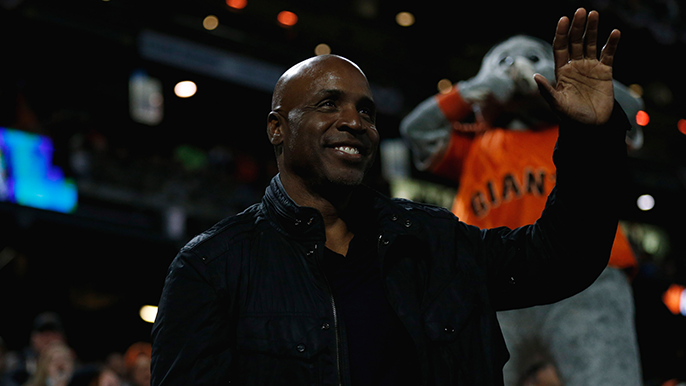
One of the most polarizing Hall of Fame candidacies is in its 10th and final year of the traditional voting process. And so far, it’s going well for Barry Bonds.
Bonds, baseball’s all-time home run leader, needs to be included on at least 75% of ballots to be enshrined into the Baseball Hall of Fame. So far, according to public and anonymous ballots tracked by Ryan Thibodaux, Bonds is polling at 80.2% — enough to induct him.
Just under 25% of ballots have been tracked so far by Thibodaux. There are 392 ballots cast, meaning a candidate needs at least 294 votes for induction. Bonds already has 77 confirmed. Friday, Dec. 31, is the last day for voters to submit ballots.
So far, first-time candidate David Ortiz is leading all voting, per Thibodaux’s database, with 82.3% of votes. Bonds and Roger Clemens (79.2%) are the only other candidates on pace for enshrinement so far.
The 2022 Hall of Fame ballot is a unique glimpse into the issues that have clouded over the sport of baseball — and its flagship museum — for decades. Baseball Writers’ Association of America voters are instructed to vote “upon the player’s record, playing ability, integrity, sportsmanship, character and contributions to the team(s) on which the player played.”
Several players, most notably Bonds, represent the conundrum with modern baseball honor and glory — how to perceive exceptional players who committed sins both on and off the field, including the use of performance enhancing drugs.
Bonds’ performance enhancing drug use is widely accepted. He was convicted in 2011 of one felony count of obstruction of justice for giving an incomplete answer to a question in grand jury testimony in regards to the BALCO scandal. Details of his alleged cheating has been chronicled in investigative journalism through the years.
Bonds never tested positive for performance enhancing drugs and denied ever knowingly taking illegal substances.
Many believe Bonds’ perceived steroid use tainted his accomplishments on the field. His 756th home run ball which broke Hank Aaron’s all-time record is displayed in Cooperstown with an asterisk lasered into it.
In addition to suspected PED use, Bonds has also been accused of domestic abuse by multiple women, allegations that fall into the “integrity” and “character” aspects of the voting guidelines.
But there are suspected steroid users and abusers already honored in Cooperstown. This particular round of candidates is particularly vexing, with Bonds, Clemens, David Ortiz, Alex Rodriguez, Manny Ramirez, Omar Vizquel, Curt Schilling, Sammy Sosa, and Gary Sheffield each owning various controversies attached to their names.
Bonds’ case has been particularly polarizing. The seven-time National League Most Valuable Player first appeared on the ballot in 2013, when he received 36.2% of votes. He slowly gained more popularity with writers, but still didn’t crack 50% until 2017. Last year, he earned 61.8% of votes in a year BBWAA voters elected nobody.
The perception of Bonds is drastically different nationally than in the Bay. Bonds, whose jersey was retired by the Giants in 2018, serves as special advisor to the Giants’ CEO and attends games semi-regularly. Six of eight eligible voters with the San Francisco Chronicle plan to vote for Bonds.
Bonds will need to receive that strong of support from BBWAA voters outside of the Bay, too. Thus far, he’s on pace.
After 10 years on the ballot, players who remain unelected can be nominated by an Era Committee, which are comprised by former managers, umpires and executives as opposed to writers. But if the current trend continues, Bonds won’t need to worry about that.

